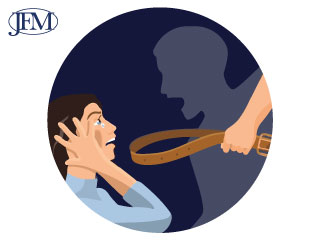
Survivors of domestic violence will often tell you that it is hard to pinpoint exactly when the abuse began, but they will agree that it started long before the first act of physical violence. Often, domestic violence escalates so slowly that you do not notice it until things have gotten really bad, much like the proverbial frog in the pot of boiling water. Domestic violence can include not only physical abuse but also emotional, sexual, or financial abuse.
The abuser may try to control the victim with threats or constant surveillance, such as tracking the location of the victim’s phone or refusing to allow the victim to have a separate bank account. The law categorizes these actions as domestic violence if the defendant and the victim are members of the same family living in the same household; this includes blood relatives, step-relatives, in-laws, and relatives by adoption or fostering.
Physical and non-physical abuse also count as domestic violence if the defendant and the victim are currently or were formerly in a romantic relationship, whether the nature of that relationship was dating unmarried cohabitation, or marriage. Acts of violence between the parents of a child also count as domestic violence, even if the parents never formally dated and only had a friends-with-benefits relationship or a single, isolated hookup.
The consequences of a conviction for a violent crime against your family member, romantic partner, or ex are even worse than the consequences of a conviction for a violent crime against someone with whom you do not have a romantic or familial relationship. If you are being accused of domestic violence or family violence, contact a New Jersey domestic violence defense lawyer.
Which Crimes Belong to the Category of Domestic Violence Offenses?
New Jersey bases its laws about domestic violence and family violence on the premise that people should feel safe in their own homes, with their families, and in romantic relationships, even the ones that have yet to become serious. New Jersey law uses the term “domestic violence” to refer to acts of violence that occur between two adults who are currently or were previously in a relationship together or who are the parents of a child together. Domestic violence can happen in same-sex relationships or in opposite-sex relationships, but one difference between domestic violence and family violence is that the victim is always an adult.
Family violence can occur between members of the same family who live in the same household. To give just a few examples out of many possibilities, it can involve a parent abusing a child, a physical fight between stepsisters, a mother-in-law abusing a daughter-in-law, or a grandson abusing his grandmother. The penalties for family violence can be especially harsh if the victim is a minor or an elderly person. There are special law enforcement task forces, including at the federal level, to investigate allegations of sexual abuse of children and financial abuse of seniors above the age of 60; these crimes sometimes, but not always, involve family violence.
The Prevention of Domestic Violence Act of 1991 does not categorize domestic violence as its own crime. Rather, the defendants in domestic violence may be charged with one or more of the following offenses:
- Assault, simple or aggravated
- Burglary
- Contempt
- Cyber-harassment
- Criminal sexual contact
- Criminal mischief
- Criminal trespass
- Kidnapping
- Lewdness
- Robbery
- Criminal coercion
- False imprisonment
- Harassment
- Homicide
- Stalking
- Terroristic threats
How Does a Domestic Violence Case in a Criminal Court Affect Your New Jersey Family Law Case?
All defendants in criminal cases,  including domestic violence and family violence cases, are presumed innocent until proven guilty. It is against the law for the criminal court to impose a sentence on a defendant unless that defendant has pleaded guilty to the charges or gotten a guilty verdict at trial. The law has deliberately set a very high standard of evidence in criminal cases (“beyond a reasonable doubt”) in order to prevent injustice.
including domestic violence and family violence cases, are presumed innocent until proven guilty. It is against the law for the criminal court to impose a sentence on a defendant unless that defendant has pleaded guilty to the charges or gotten a guilty verdict at trial. The law has deliberately set a very high standard of evidence in criminal cases (“beyond a reasonable doubt”) in order to prevent injustice.
In family courts, however, the court can consider you more dangerous than you are out of an abundance of caution (that is, to protect vulnerable family members), even if you have been accused of domestic violence but not convicted. For example, it is easy for victims of domestic violence to get restraining orders against their ex-partners, even if the case does not result in a criminal conviction. The court can also restrict your parenting time if the judge reasonably believes that your children are at risk of suffering family violence when they are with you.
A Criminal Defense Lawyer Can Help You in Your Domestic Violence Case
A domestic violence defense lawyer can help you if you are being accused of a family violence or domestic violence offense. Contact us for a free and confidential consultation.











